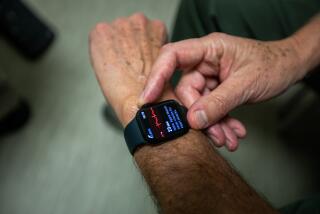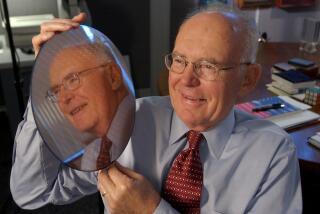Patent Office Ruling Favors TI, Firm Says
- Share via
Texas Instruments Inc. said Wednesday that the U.S. Patent and Trademark Office has ruled that one of its engineers is the rightful inventor of the single-chip microprocessor--and that the decision renders invalid a controversial patent awarded six years ago to inventor Gilbert P. Hyatt.
Hyatt jolted the electronics world in 1990 when he announced that he had been granted a broad patent for a computer-on-a-chip, a device that today is used in everything from personal computers to cars and television sets. Dallas-based Texas Instruments disputed the claim, and other companies--including microprocessor giant Intel Corp.--insisted that Hyatt’s patent was not valid and they would not pay him royalties.
In a news release issued late Wednesday, TI said it had finally prevailed in its formal challenge to the patent, known as an “interference” proceeding. In a ruling issued in May but not made public until Wednesday, the Patent Office affirmed a previous decision indicating that Gary W. Boone of Colorado Springs, Colo., is “considered to be the prior inventor” of the technology.
Hyatt, 58, who for 25 years has battled big companies in asserting his claim as the inventor, immediately disputed Texas Instruments’ statements, saying that the company has twisted the facts.
“Texas Instruments did not get credit for it,” said Hyatt, now a Las Vegas resident. The complicated, multi-part patent office ruling denied Boone the patent as well, saying he had withdrawn his patent application in favor of a so-called “Statutory Invention Registration” declaring him the inventor.
That means Texas Instruments will have no claim to royalties.
“The game is not over yet,” said Hyatt, who vowed to appeal the Patent Office ruling in federal court.
Hyatt has already signed patent licensing agreements with companies such as Philips, Sony and NEC. He declined to say how much he has received, though some industry efforts put it well into the tens of millions of dollars. “It does give me enough capital to support my research efforts,” was as much as Hyatt would say.
Boone was not available for comment Wednesday.
The federal patent office has been wrestling with the issue since it awarded patent No. 4,942,516 to Hyatt, then a resident of La Palma, in the summer of 1990.
Texas Instruments claimed that Boone and his colleagues at the company built the first functioning microcontroller--a computer-on-a-chip--on July 4, 1971. Boone’s research was part of an effort to build chips to power hand-held calculators. The Dallas-based company was awarded a patent in 1978.
Hyatt claimed he invented the microcontroller about a year before the Texas Instruments engineers. Hyatt filed an application with the patent office in December 1970, and that application was amended several times in later years, according to Louis Touton, a partner with the Dallas law firm of Jones, Day, Reavis & Pogue, which represents Texas Instruments.
Hyatt was awarded a broad patent for a design for a computer-controlled milling machine, which included a description of putting all the functions on a single chip, Touton said. When his patent came to the attention of Texas Instruments, the company initiated what is known as an interference proceeding with the patent office to determine who was the rightful holder of the microcontroller patent.
After a five-year review of tens of thousands of pages of documents, the patent office ruled that Hyatt did not describe a microcontroller until 1977, in one of many amendments known as a continuation. That was six years after the Texas Instruments application.
Hyatt and his attorney, Greg Roth of La Palma, said that the patent office’s decision related to certain parts of Hyatt’s patent, not all of it. And they asserted that the problem was in the way attorneys described the patent, which they said would now be clarified in court.
More to Read
Inside the business of entertainment
The Wide Shot brings you news, analysis and insights on everything from streaming wars to production — and what it all means for the future.
You may occasionally receive promotional content from the Los Angeles Times.












